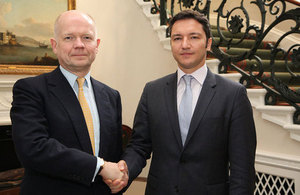UK and Bulgaria reaffirm commitment to strong bilateral relations
The Foreign Secretary William Hague met Bulgarian Minister of Foreign Affairs, Kristian Vigenin, on Thursday 16 January in London.

Foreign Secretary William Hague meeting Kristian Vigenin, Bulgarian Minister of Foreign Affairs in London,
The Foreign Secretary William Hague and Foreign Minister Kristian Vigenin said:
Today we have reaffirmed our commitment to a strong and productive bilateral relationship. As EU and NATO partners, the UK and Bulgaria share a range of common interests.
This year, Bulgaria celebrates the tenth anniversary of its accession to NATO. We discussed NATO priorities ahead of this year’s Summit in the UK. In particular we discussed the necessity to invest in the right capabilities and enhanced partnerships in order to keep the Alliance efficient and ready to tackle the 21st century threats and challenges, we expressed our desire to reconfirm NATO’s Open Door policy. We value our constructive cooperation in the framework of NATO and EU operations and missions.
We discussed some of the important issues facing EU Member States. We reaffirmed the necessity of further efforts focusing on successfully surmounting the impact of the global financial and economic crisis, noting recent positive economic signs. In particular we focused on our Governments’ efforts to apply proper measures, both at EU and national level, aimed at increasing growth and competitiveness. These measures should include lowering the regulatory and administrative burden for business, especially small-business, completing the single market in services and digital single market, and ambitious trade agreements between the EU and key countries. Such policies would create more jobs, especially for young people.
We discussed foreign policy priorities including the EU Eastern Partnership, the Western Balkans region as well as the situation in Syria, noting our close or coinciding positions. We reaffirmed our commitment to the enlargement of the European Union and welcomed in particular the decision to start accession negotiations with Serbia and the opening of the SAA negotiations with Kosovo. In contrast, we expressed our shared concern at the lack of Bosnia and Herzegovina’s progress towards EU integration. Overall, we agreed that the future of all Western Balkan countries lies within the EU based on their own progress in meeting the necessary criteria.
We reconfirm that the Eastern Partnership remains an EU priority. We consider Ukraine to be an important international partner and reiterate that the negotiated AA/DCFTA remains open for signature. We also want to sign, as soon as possible, the AA/DCFTAs with Moldova and Georgia.
In light of the expiry of working restrictions on Bulgarian and Romanian nationals on 1 January, we acknowledged the positive contribution that most Bulgarians currently in the UK make to the economy. We reiterate that the free movement of workers in the EU on a non-discriminatory basis is an important part of the Single Market and a factor for growth, competitiveness and jobs.
We also discussed the importance of building on our existing work to prevent potential abuses of the right to free movement of workers by EU and third-country nationals, as well as labour exploitation. We look forward to the signing of a joint letter of intent which will enable British and Bulgarian officials to continue and step-up their cooperation on this.
We discussed our common interests on energy, and looked forward to continuing our bilateral Energy Dialogue, especially in the context of Bulgaria’s ambitions to increase the diversity of its energy supply. We agreed that the UK would continue to work with Bulgaria on its energy development, both in the civil nuclear and gas fields.
We looked forward to future opportunities to renew and intensify our high-level bilateral dialogue on key issues of mutual interest.
Further information
Follow the Foreign Secretary on twitter @WilliamJHague
Follow the Foreign Office on twitter @foreignoffice